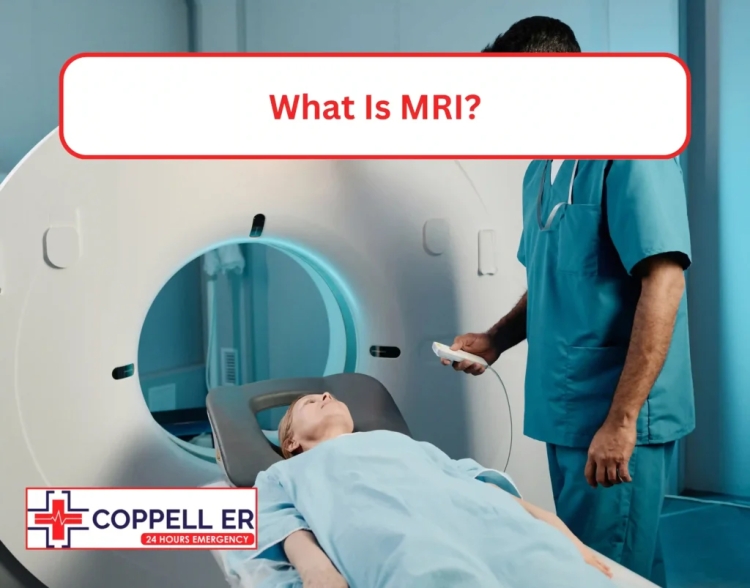CT vs MRI Scan: 7 Key Differences You Need to Know
Discover the 7 key differences between CT and MRI scans. Learn about their uses, pros, cons, safety, and cost to make an informed choice with ER of Coppell.

Introduction
When it comes to medical imaging, understanding the CT vs MRI scan debate is crucial. Both technologies play vital roles in diagnosing a wide range of health conditions. However, they differ significantly in terms of technology, applications, safety, and effectiveness. This comprehensive guide will walk you through everything you need to know to make an informed decision.
What is a CT Scan?
A CT (Computed Tomography) scan uses X-rays to create detailed cross-sectional images of the body. It provides more detailed information than regular X-rays, making it particularly useful for diagnosing bone fractures, tumors, and internal bleeding.
How CT Scans Work
-
Uses X-ray beams that rotate around the body
-
Captures multiple images from different angles
-
A computer processes these images to create cross-sectional views
Common Uses of CT Scans
-
Detecting bone fractures
-
Identifying tumors
-
Diagnosing internal bleeding
-
Monitoring the effectiveness of treatments
What is an MRI Scan?
An MRI (Magnetic Resonance Imaging) scan uses strong magnetic fields and radio waves to produce detailed images of organs and tissues inside the body.
How MRI Scans Work
-
Uses a powerful magnet to align hydrogen atoms in the body
-
Radio waves are then used to disturb this alignment
-
The energy released during realignment is captured to create detailed images
Common Uses of MRI Scans
-
Examining soft tissues like the brain, muscles, and ligaments
-
Detecting tumors
-
Monitoring brain and spinal cord conditions
-
Evaluating joint injuries
Key Differences Between CT and MRI Scans
| Feature | CT Scan | MRI Scan |
|---|---|---|
| Technology | X-rays | Magnetic fields & radio waves |
| Best For | Bone injuries, lung issues | Soft tissue evaluation |
| Radiation Exposure | Yes | No |
| Scan Duration | Quick (5-10 mins) | Longer (30-60 mins) |
| Cost | Less expensive | More expensive |
| Noise Level | Quiet | Loud, requires ear protection |
| Suitability with Implants | Generally safe | Not safe with metal implants |
CT vs MRI Scan: Pros and Cons
Pros of CT Scans
-
Quick imaging process
-
Effective for emergency situations
-
Detailed images of bone structures
Cons of CT Scans
-
Exposure to ionizing radiation
-
Limited effectiveness for soft tissue evaluation
Pros of MRI Scans
-
No radiation exposure
-
Superior soft tissue contrast
-
Ideal for neurological and joint imaging
Cons of MRI Scans
-
Longer scan times
-
Expensive
-
Not suitable for patients with metal implants
Which One Should You Choose?
The choice between a CT and MRI scan depends on various factors:
-
For bone injuries: CT scan
-
For brain, spinal cord, and soft tissues: MRI scan
-
For emergency diagnostics: CT scan (due to speed)
-
For avoiding radiation: MRI scan
Safety Considerations
CT Scan Safety
-
Minimal risk but involves radiation exposure
-
Not recommended for pregnant women unless absolutely necessary
MRI Scan Safety
-
Safe for most people
-
Not suitable for individuals with metal implants, pacemakers, or certain tattoos
Cost Comparison
-
CT Scan: Generally less expensive
-
MRI Scan: Higher cost due to advanced technology
Health insurance may cover both scans depending on the medical necessity.
FAQs
1. Is an MRI safer than a CT scan?
Yes, because MRI scans do not involve radiation.
2. Which scan is faster?
CT scans are faster, usually completed within 5-10 minutes.
3. Can I get a CT or MRI scan if I have metal implants?
CT scans are generally safe, but MRI scans are not recommended with metal implants.
4. Why would a doctor order both CT and MRI scans?
To get comprehensive images when diagnosing complex conditions.
5. Is a CT scan more accurate than an MRI?
It depends on the condition. CT is better for bones; MRI excels in soft tissues.
What's Your Reaction?





















